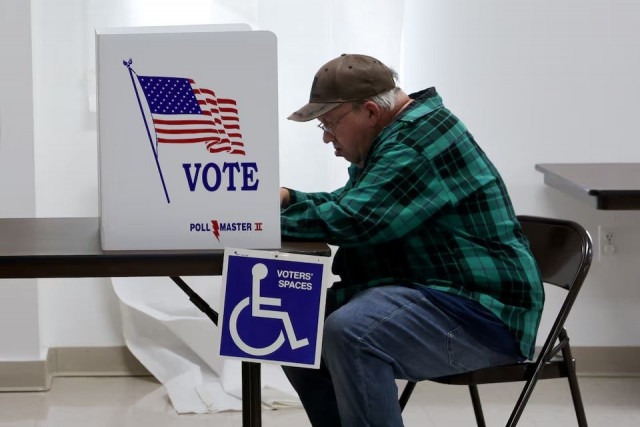Trump and Harris split early results
Initial results show Trump and Harris split early victories; final outcome depends on seven pivotal swing states

Republican Donald Trump secured victories in eight states during Tuesday's US presidential election, while Democrat Kamala Harris won three states and Washington, D.C., according to projections by Edison Research. However, the outcome remained undecided, with key battleground states potentially taking hours or days to declare results.
The anticipated results came as both candidates focused on seven swing states: Georgia, North Carolina, Pennsylvania, Arizona, Michigan, Nevada, and Wisconsin.
Pre-election polls had shown a tight race in these states. By 8 p.m. ET (0100 GMT on Wednesday), voting had concluded in 25 states.
Trump held 90 electoral votes after winning in Kentucky, Indiana, West Virginia, Alabama, Florida, Oklahoma, Missouri, and Tennessee, while Harris had 27 from Vermont, Maryland, Massachusetts, and Washington, D.C. A total of 270 electoral votes are needed to win the presidency.
Preliminary exit polls by Edison highlighted voter concerns, with about three-quarters indicating that American democracy was at risk. Democracy and the economy were cited as the top issues, each by roughly a third of respondents, followed by abortion and immigration.
The poll showed that 73% of voters believed democracy was under threat, compared to 25% who thought it was secure.
The data highlighted significant polarisation, as Trump employed severe rhetoric, raising unsubstantiated doubts about the electoral process. Harris warned that another Trump term could endanger U.S. democracy. These figures represented only part of the millions who cast votes, and preliminary results could shift as more data emerged.
Before polls closed, Trump claimed without evidence on his social media platform, Truth Social, that there was widespread "CHEATING" in Philadelphia, echoing false claims he made in 2020. He also alleged fraud in Detroit. Detroit City Clerk Janice Winfrey dismissed the claim as "nonsense," and Philadelphia City Commissioner Seth Bluestein stated that there was "no truth" to the allegations, calling them disinformation.
Trump, who cast his vote earlier near his Florida residence, signalled that he might prematurely declare victory on election night, as he had four years prior. If results in swing states were close, the final outcome might not be clear for days.
Despite some isolated incidents, such as bomb threats believed to originate from Russian email accounts, voting proceeded with minimal disruptions. Trump watched the election returns at his Mar-a-Lago club, joined by allies including Tesla CEO Elon Musk.
Meanwhile, Harris, who had already voted by mail, conducted radio interviews urging voter participation and later addressed students at Howard University, her alma mater. She described the event as symbolic of her journey.
This historic race, marked by extraordinary events including two assassination attempts on Trump, Biden's unexpected withdrawal, and Harris' rapid ascent, remained undecided after extensive campaigning and significant financial expenditure.
Harris, if successful, would be the first woman, Black woman, and South Asian American president. Trump, who has been impeached twice and was criminally convicted as a former president, would become the first to win non-consecutive terms in over a century.
Both chambers of Congress were also contested, with Democrats facing a narrow path to maintain Senate control after Republican Jim Justice won a seat in West Virginia. The House of Representatives appeared too close to predict.
In Dearborn, Michigan, Nakita Hogue, 50, and her college-aged daughter Niemah voted for Harris, motivated by concerns over reproductive rights. In Phoenix, Arizona, union plumber Jesse Miranda, who moved to the US from Mexico as a child, supported Trump, believing he would better manage inflation and immigration.



















COMMENTS
Comments are moderated and generally will be posted if they are on-topic and not abusive.
For more information, please see our Comments FAQ